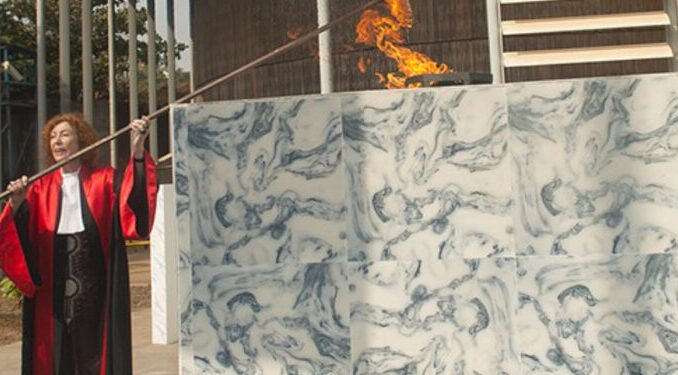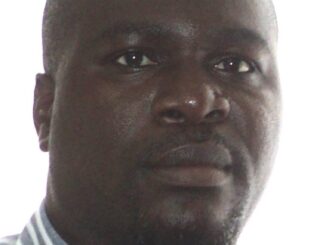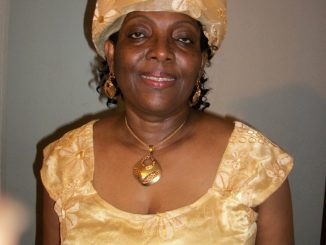
RSCSL Legacy Conference Wraps Up in Freetown

More than 250 prominent jurists, diplomats, legal scholars, students, civil society activists, members of the RSCSL Oversight Committee, and other stakeholders from Sierra Leone and abroad met in the Sierra Leonean capital this week to examine the Special Court’s legacy, to share experiences and insights, and to chart a way forward
for international justice. The conference was organized by the Residual Special Court and its partners.
Keynote speakers were Sierra Leone’s Vice President, Dr. Mohamed Juldeh Jalloh and UN Assistant Secretary-General for Legal Affairs Mr. Stephen Mathias. Dr. Jalloh said the old Special Court compound would be developed into a justice sector complex. He reaffirmed the Government of Sierra Leone’s commitment to the Residual Special Court and its mandate. Mr. Mathias spoke about the United Nations’ support to the Court and highlighted its achievements.
ICC Prosecutor Karim Khan discussed the Special Court’s impact on other tribunals and international criminal justice.
Registrar Binta Mansaray stressed that the purpose of the conference was not to discuss the legacy of the Special Court as such. She noted that the Special Court’s history has been written. “This conference is concerned with the current challenges and conflicts around the world. It is about experience-sharing and
looking to the future to see how we will collaborate and coordinate in sharing experiences and solving problems of international justice.”
Some of those who attended the conference came from several “hot spot” countries where violations of international humanitarian law are either ongoing, or have taken place in the recent past.
Amb. Beth Van Schaack, Ambassador-a-Large for Global Criminal Justice, Justice Ekaterina Trendafilova, President of the Kosovo Specialist Chambers, Sierra Leone’s Attorney-General and Minister of Justice Mohamed Lamin Tarawally, and other distinguished persons, many of whom travelled from three continents, took part in the conference.
During the conference, which ended on Wednesday, experts from Sierra Leone, other parts of Africa, Europe and North America participated in six panels to address issues such as judicial capacity building, the SCSL’s hybrid nature and its viability as a model for future tribunals, and the future of international justice.
The experts discussed outreach and witness and victim protection and support, memorialization, preservation and threats to the legacy of the Special Court, transitional justice mechanisms, and the future of residual and investigative mechanisms to carry on the continuing legal obligations of the courts that preceded them.
The conference ended on Wednesday with a tour of the Sierra Leone Peace Museum and Memorial Garden, a legacy of the Residual Special Court, and the Lighting of the Flame of Justice by Justice Renate Winter in front of the Special Court’s courthouse.
#END
The Residual Special Court for Sierra Leone is responsible for the ongoing legal obligations of the Special Court for Sierra Leone, which concluded its mandate in December 2013. These include supervision of prison sentences, witness protection and support, maintenance and preservation of the archives, and assistance to national prosecution authorities.
Judge Paula da Conceição Machatine Honwana sworn in as RSCSL Justice

Justice Paula da Conceição Machatine Honwana was sworn in today as a Judge of the Residual Special Court for Sierra Leone (RSCSL). In a ceremony held in Freetown prior to the opening of the Plenary of Judges, Justice Machatine Honwana made a solemn declaration before RSCSL Vice President Justice Emmanuel E. Roberts to “without fear or favour, affection or ill-will, serve as a Judge of the Residual Special Court for Sierra Leone honestly, faithfully, impartially and conscientiously.” She subscribed to the solemn declaration in front of witnesses representing the two parties to the RSCSL Agreement. Stephen Mathias, Assistant Secretary-General for Legal
Affairs, witnessed the declaration on behalf of the Secretary-General of the United Nations, and Mohamed Lamin Tarawally, Attorney-General and Minister of Justice, witnessed on behalf of the Government of Sierra Leone.
Justice Machatine Honwana succeeds the late Justice Elizabeth Ibanda-Nahamya, who passed away in January 2023.
The RSCSL Statute provides for a roster of 16 Judges, ten of whom are appointed by the Secretary-General of the United Nations, and the remaining six by the Government of Sierra Leone. The Judges receive no compensation for being on the roster, but are paid on a pro rata basis if called upon to serve the Court. Justice Machatine Honwana was appointed by the Secretary-General of the United Nations.
From 2011-2014, and again from 2020-2022, she served as a Judge of the Superior Court of Appeals in Mozambique. From 2014 to 2020, she served as Legal Adviser to the President of the Supreme Court of Mozambique. Since 1998 she has served as a Judge in Mozambique in various capacities, in Civil and Labour Divisions of the First Instance Court, and from 2001-2011 was Secretary-General of the Superior Council of the Judiciary, the management and disciplinary board of the Mozambican judiciary.
Justice Machatine Honwana was a member of the Review Committee of the Statute of Mozambican Judges, the Legal Framework of the Superior Council of the Judiciary, and other legal instruments linked to the judiciary.
She has taught law at the Higher Institute of Sciences and Technology of Mozambique (ISCTEM), and at the Centre of Judicial and Judiciary Training in Maputo, Mozambique. She co-authored the book Manual de Formação e Apoio ao Magistrado Judicial em Matéria de Criminalidade Contra a Vida Selvagem (Training and Support Handbook for Judges on Wildlife Crime) in 2022, and has authored a number of articles and academic papers.
Since 2022 Justice Machatine Honwana has served as Legal Adviser at the Permanent Mission of the Republic of Mozambique to the United Nations in New York.
She received a Degree Graduate “Licenciatura” in Law in 1997 from the Faculty of Law at the University of Lisbon in Portugal. In 2017 she earned a Master’s degree in Public and International Law at the University of Melbourne in Australia, and in 2021 she received a Postgraduate degree in International Contract Law from Eduardo Mondlane University in Mozambique.
#END
The Residual Special Court for Sierra Leone is responsible for the ongoing legal obligations of the Special Court for Sierra Leone, which concluded its mandate in December 2013. These include supervision of prison sentences, witness protection and support, maintenance and preservation of the archives, and assistance to national prosecution authorities.




Leave a Reply